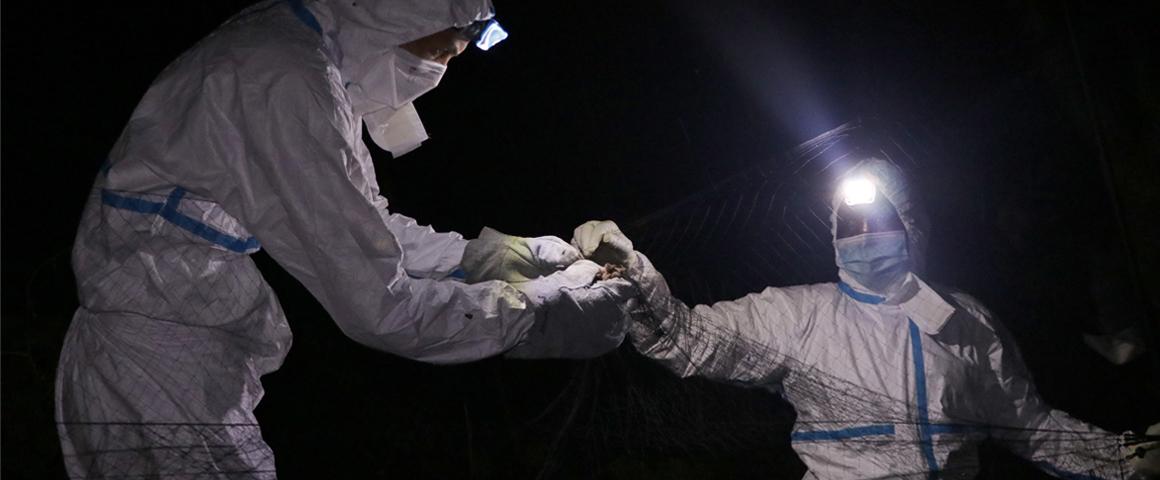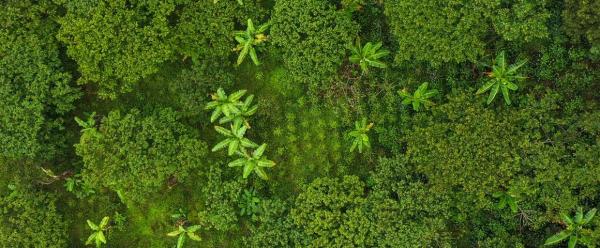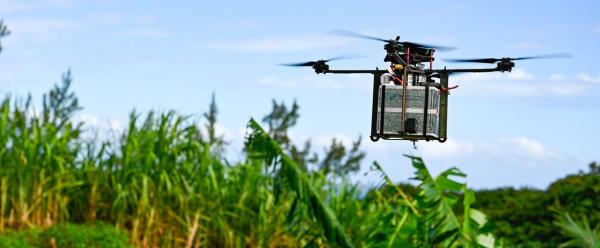Results & impact 10 October 2025
- Home
- Press area
- Press releases
- The EBO-SURSY project delivers its final results
After seven years working to combat zoonotic diseases in Africa, the EBO-SURSY project delivers its final results

Capture of a bat in Magweto cave - Hunrungwe © Angela Jimu
Launched in 2017 following the 2016 Ebola virus outbreak, the EBO-SURSY project was implemented to build epidemiological surveillance capacities for zoonotic diseases in Africa, in particular: Ebola virus, Marburg virus, Rift Valley fever, Crimean-Congo haemorrhagic fever, Lassa fever and coronaviruses. The project studied these pathogens according to a “One Health” approach, in other words at the animal-human-environment interface. Some 60% of human infectious diseases are in fact of animal origin.
In the Republic of the Congo, the EBO-SURSY project developed a multisectoral approach to improve understanding of the mechanisms involved in zoonotic disease outbreaks. Numerous field missions were conducted in the Cuvette, Niari and Bouenza regions to study the ecology of bats and the circulation of haemorrhagic fevers and coronaviruses, in close collaboration with Marien Ngouabi University (UMNG), the National Public Health Laboratory (LNSP) and the Directorate-General for Livestock (DGE).
Based on the principle that knowledge dissemination on zoonoses and diagnostic technology transfer to local actors would improve surveillance, preparedness and response, the EBO-SURSY project was organised around three components:
- building institutional capacities through education and training;
- raising awareness among communities and national technical services about the risks associated with zoonotic diseases;
- strengthening surveillance protocols through multidisciplinary scientific field studies and the development of better diagnostic tests.
Capacity building through education and training
Over the course of the project, more than 75 Congolese students and professionals were trained, thereby contributing to the creation of a “task force” of specialists in public health, veterinary sciences and environmental sciences. In addition to these different technical and academic training courses, the EBO-SURSY project built capacities among veterinary services (DGE) through an evaluation of Veterinary Service Performance (PVS).
Raising awareness among communities about zoonoses
In Congo, more than 200 local technical agents and community representatives were mobilised through awareness and public education campaigns aimed at informing local people about the risks associated with zoonotic diseases. The project also published 12 scientific articles on the research conducted in the Republic of the Congo and developed 16 awareness tools adapted to local contexts, which all strengthened community resilience to emerging health threats, including a serious game (ALERTE) and a teaching kit.
Improving surveillance protocols for viral haemorrhagic fevers
EBO-SURSY contributed to designing an integrated surveillance strategy for Rift Valley fever, following the “One Health” approach and involving the Ministry of Health, the Ministry of Agriculture, Livestock, and Fisheries, and the Ministry of Environment and Sustainable Development of the Republic of the Congo. To strengthen intersectoral collaboration, the project organised a technical workshop in partnership with WHO to draw up a joint multisectoral “One Health” roadmap.
Different data and samples were collected at Congolese study sites to understand the dynamics involved in the transmission of zoonotic diseases. These are stored in a general database that can be accessed online by local partners and the general public in order to centralise and share all information produced by the EBO-SURSY project.
Finally, participatory approaches were implemented to boost local community involvement in systems for the surveillance and rapid detection of haemorrhagic fever outbreaks.
The EBO-SURSY project
The EBO-SURSY project is a major collaborative initiative that has built epidemiological surveillance capacities for zoonotic diseases in 10 African countries: the Republic of the Congo, Côte d'Ivoire, Cameroon, the Central African Republic, the Democratic Republic of the Congo, Gabon, Guinea, Liberia, Senegal and Sierra Leone. Financed by the European Union with a budget of 10 million euros, the project is coordinated by WOAH, CIRAD, IRD and Institut Pasteur. This project has been a catalyst for training, awareness raising and improved surveillance protocols in the region.
- 197 field surveys
- 43 000 animal samples and 6000 human samples
- 43 studies published
- 25 diagnostic methods or tools developed
- 700 students and professionals trained
Read about all of the project findings in the special issue of the journal Virologie published for the project's closing conference in Senegal in late 2023.
Read the full final report


























